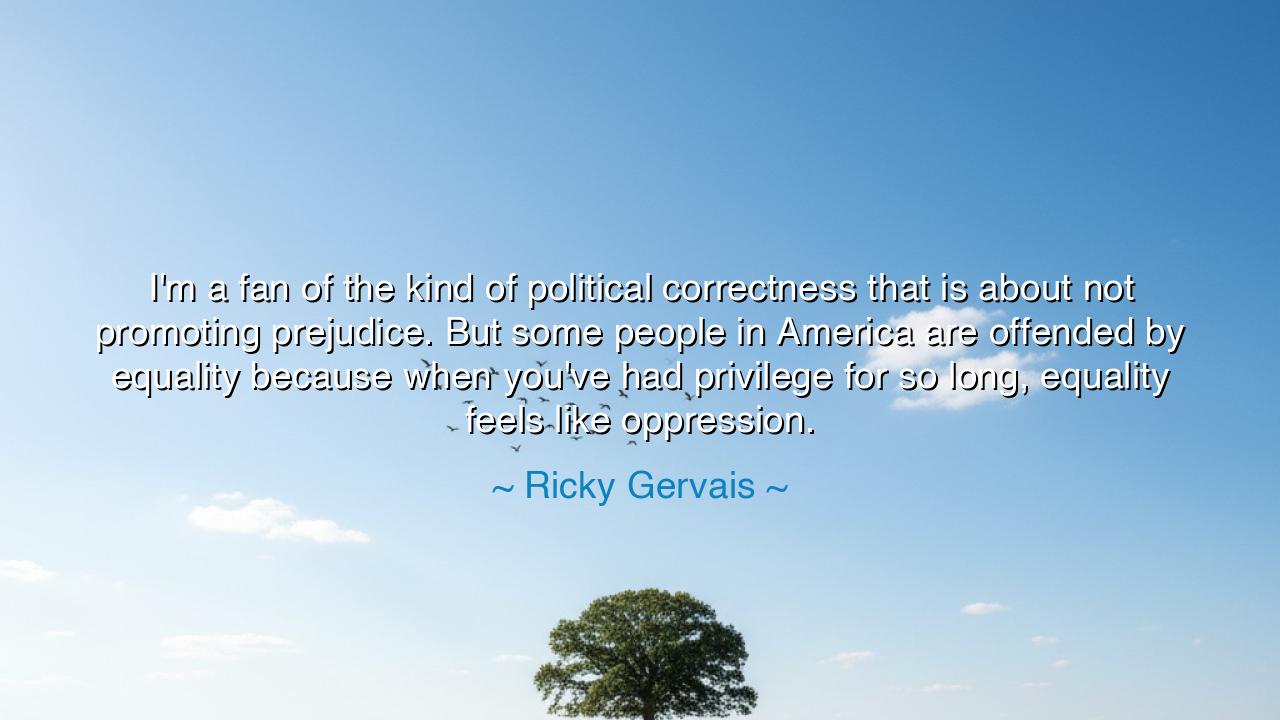
I'm a fan of the kind of political correctness that is about not
I'm a fan of the kind of political correctness that is about not promoting prejudice. But some people in America are offended by equality because when you've had privilege for so long, equality feels like oppression.






“I’m a fan of the kind of political correctness that is about not promoting prejudice. But some people in America are offended by equality because when you’ve had privilege for so long, equality feels like oppression.” These words of Ricky Gervais, though spoken in modern times, carry the weight of timeless truth. Beneath their humor and sharpness lies an ancient moral lesson — that justice, when it finally arrives, feels harsh to those who once lived without it. Equality, though noble in essence, shakes the comfortable and confronts the powerful, for it demands that the scales of privilege be balanced, and in that balancing, those who once stood higher must descend.
Gervais speaks of political correctness, a phrase often misunderstood. In its truest form, it is not a cage for free speech, but a shield against cruelty — a way of reminding society that words, too, can wound, and that respect is the soil in which civilization grows. Yet his deeper warning is not about speech but about privilege — that invisible cloak worn by those who live without knowing its warmth. For when privilege becomes normal, equality feels like loss. The one accustomed to walking above others mistakes fairness for persecution, as if the lifting of the oppressed were the lowering of the mighty.
The ancients, too, understood this paradox. When the great lawgivers — from Solon of Athens to Confucius of China — sought to balance the powers of the rich and the poor, they faced resistance not from the wicked, but from the comfortable. The wealthy citizens of Athens cried out that Solon’s reforms were unjust, not because he stole from them, but because he took away their advantage. Yet Solon replied, “I gave to each what was due — I took from none what was his.” So too in our age, the call for equality offends not because it is unfair, but because it exposes what was always unfair before.
Consider the story of Nelson Mandela, who after 27 years of imprisonment emerged not seeking revenge, but justice. When apartheid fell, many in South Africa’s white minority felt fear — they mistook equality for danger, freedom for chaos. They could not see that Mandela’s vision was not to destroy their world, but to make it just. His triumph was not political alone, but spiritual, for he taught that equality does not diminish anyone — it restores everyone. This is the heart of Gervais’s quote: that when balance returns to a world long tilted, those who once stood high must learn to stand level — and call it grace, not grievance.
Privilege, once unexamined, blinds the soul. Those who benefit from it often cannot see its presence until it is challenged. Like fish unaware of water, they mistake their comfort for natural order. But equality, when it rises, reveals the illusion — and the revelation is painful. Yet pain is the beginning of wisdom. For just as muscles grow through strain, societies grow through discomfort. The moment equality feels like oppression is the moment truth begins to dawn — that fairness has finally entered the room.
Ricky Gervais, through the lens of humor and irony, wields a philosopher’s clarity. He reminds us that political correctness, at its best, is not tyranny but compassion — the attempt to build a world where speech uplifts rather than degrades, where jokes no longer rest on cruelty. Yet he also warns that equality is not a threat to be feared but a balance to be embraced. For when the privileged learn humility, and the marginalized find their voices, humanity itself becomes stronger, more honest, and more whole.
So, my children, take this teaching to heart: do not mistake fairness for loss, nor equality for oppression. When others rise, you do not fall — you ascend with them into the higher order of justice. Let your words be kind, your humor wise, your heart aware of its own advantages. The true test of character is not how one speaks when unchallenged, but how one listens when others demand their due. For only when we learn to rejoice in another’s equality do we become truly free — not merely as individuals, but as a people worthy of the name human.






AAdministratorAdministrator
Welcome, honored guests. Please leave a comment, we will respond soon